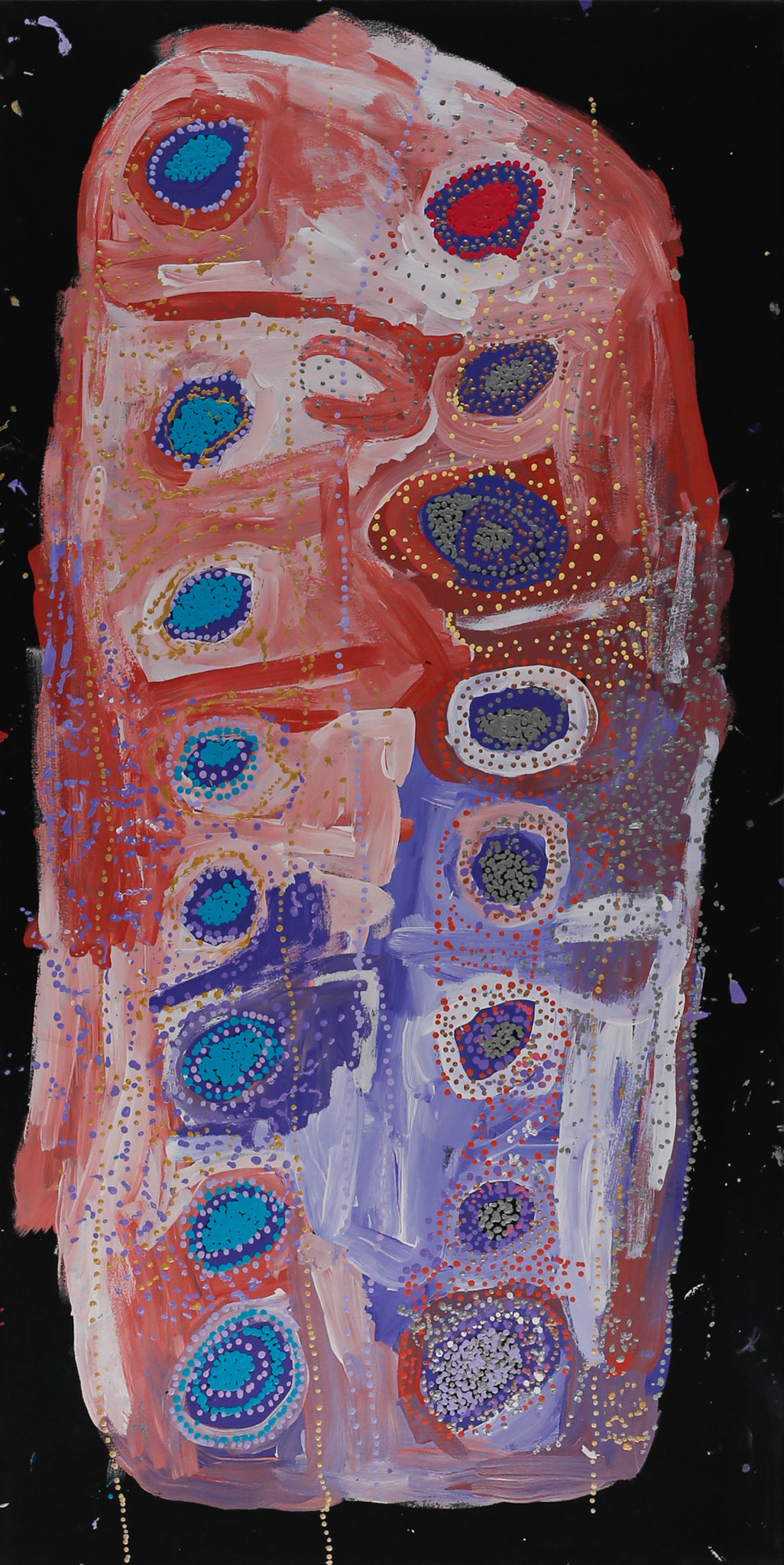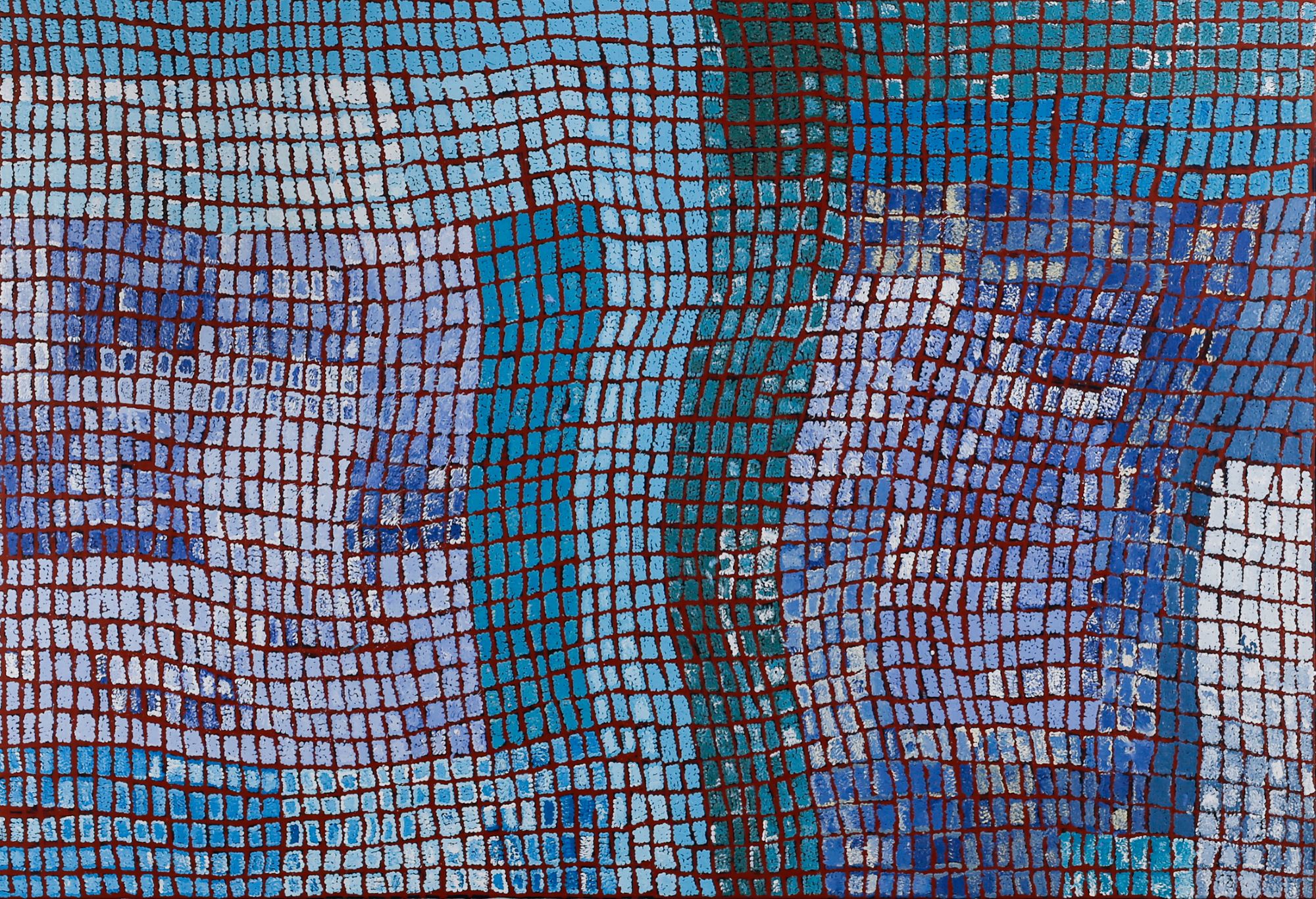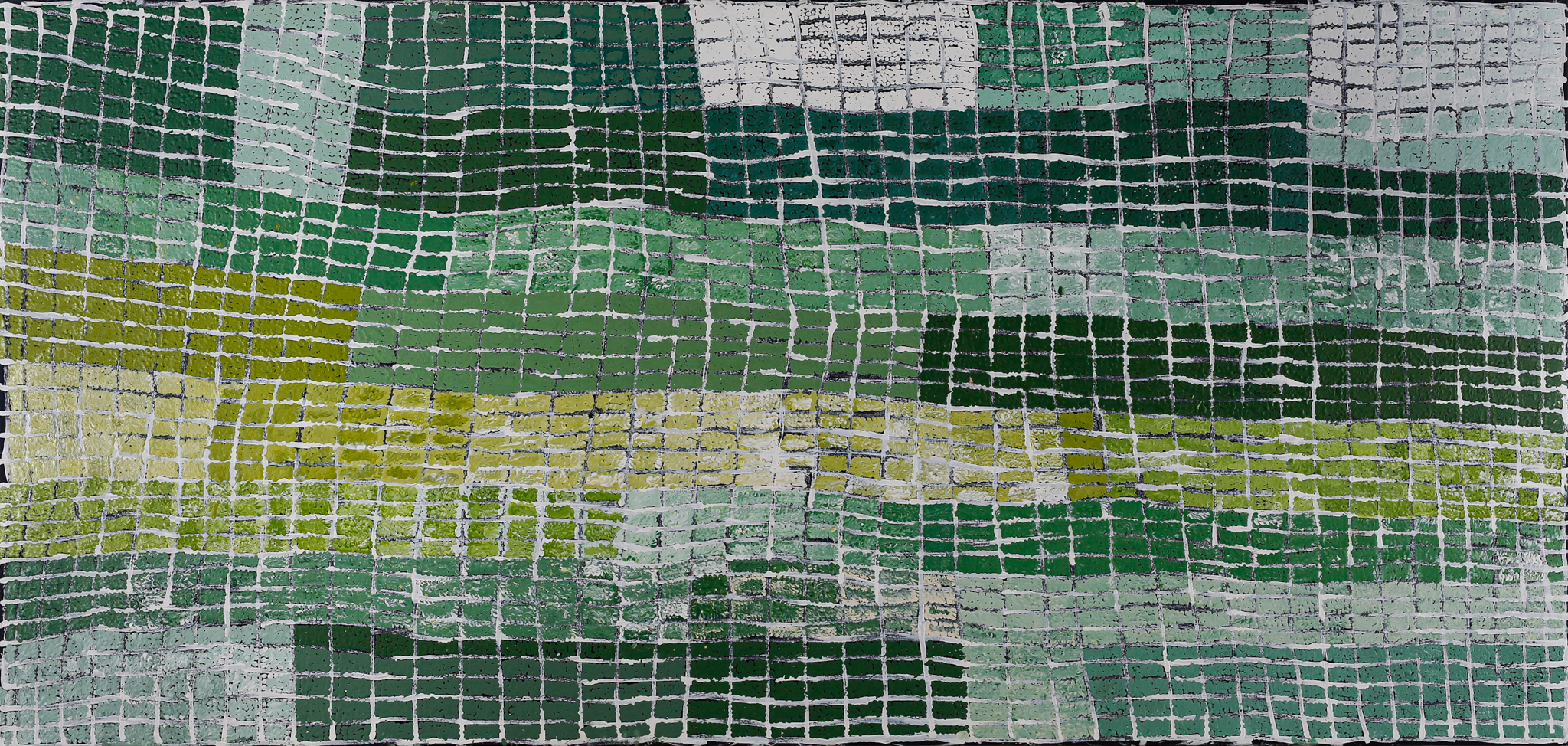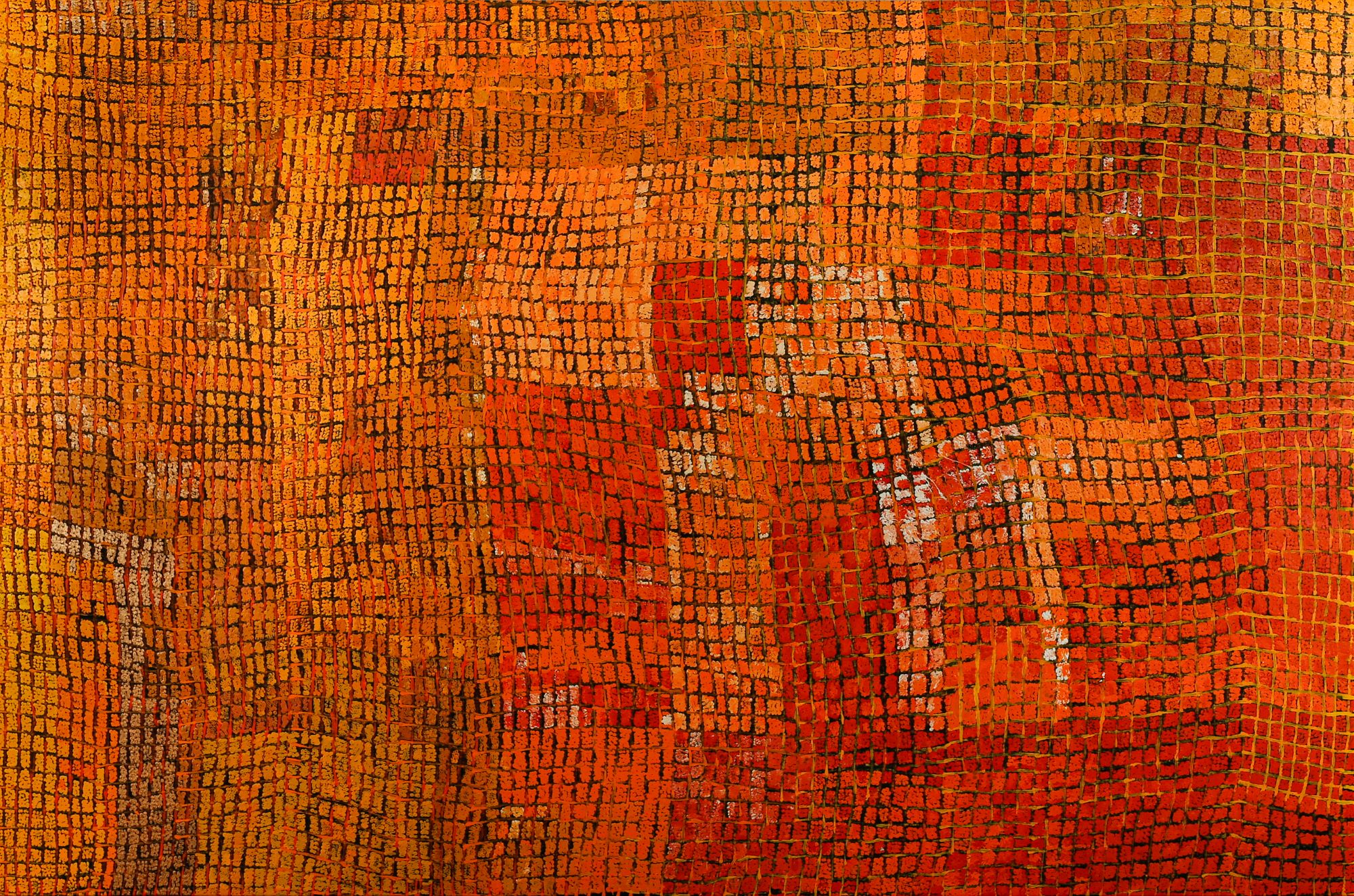Patjarr ngurra pirni | the whole stretch of Patjarr country
Warakurna Women
21 Jun
2025
2025
12 Jul
2025
For Nola Yurnangurnu Campbell, Nyungawarra Ward Napurrula and Nancy Nyanyarna Jackson, Patjarr, and the surrounding country (what is recognised now as the Pila Nature Reserve, formerly the Gibson Desert Nature Reserve) forms part of their traditional homeland. Patjarr, the smallest community in the Ngaanyatjarra Lands, is perhaps the most remote place in Australia. This isolation is turned on its head by these artists, whose mere presence and dedication to living as close as possible to their ancestral land made this tiny outpost of the Kayili Artists art centre possible. The painters from Patjarr have created an astonishing artistic legacy in a place where, on a busy day, forty people live, and on a quiet day, only a few unhappy dogs can be seen guarding the dusty grid of houses deep in the Gibson Desert.
For these three ladies painting is a deeply personal act of remembrance, and time spent on country and connecting to that country is significant to their artistic practice. It offers a meditation on the historical significance of this country and to their Tjukurpa, which helps to honour the memory and authority of those that came before them in a community that stands at the threshold of contemporary practice and ancient tradition.
“I like being able to paint the country I grew up in, was born in, to keep it alive. It also makes me think about my mother and my family who used to walk this country long before me. The country I paint is their country too. It’s my husband’s, my nguntu (mother’s), ngayuku kaparli (my grandmother’s) and ngayuku tjamu (my grandfather’s).” — Nola Campbell
These artists maintain a strong connection to the bush and often return to Patjarr to paint on Country. During these fortnight long painting camps, the ladies spend most of their time hunting and visiting cultural sites. “Painting occupies the spaces between these activities, especially in the evening after dinner – when often the two ladies will continue to work long into the night, sharing stories and recollections that both inform and reinforce their practice.” — Jacob Gerrard-brown
As senior women of the desert, each holds the cultural authority to depict the Tjukurrpa of her Country. The works in Patjarr ngurrapirni are both aesthetically powerful paintings and visual records of ancestral knowledge, encoded through dotting, brushwork, and rich colours. Within them are maps of journey, sites of transformation, and the memory of kin. Through their continued practice, the songlines of Patjarr remain intact.
Installation View
Artworks












































Artist Profile/s
Nola Campbell
Lives
Nola Campbell was born out bush on the other side of Tatjarr (close to Patjarr) in the late 1940s. She grew up travelling in the Country between Kiwirrkurra and Kunawarritji. She is related to Charlie Wallabi (Walapayi) Tjungurrayi and Nangkatji Josephine Nangala, whom she called father and mother, and Kumpaya Girgaba, her aunt. Nola lost her parents when she was young and was brought up by Norma Giles’ (nee Carnegie) mother and father, Mankatji Carnegie and Mr Carnegie. Nola was taken to Warburton as a young woman and there she married her first husband, Mr Butler. She moved to Wiluna and later Patjarr, where she later married artist Coiley Campbell.
Nola has been the subject of an Indigenous Community Stories produced film, titled Nola’s Story. The film aired during the 2016 Fremantle Art Centre Revealed Program in conjunction with the Maritime Museum and Indigenous Community Stories.
From Nola: “I remember when I was a little girl, walking to collect water from Tika Tika and taking it back to my family. I remember when Ian Dunlop came out in the 1960s to take photos and film, and I remember my first ‘acting’ job. I remember walking around with family, hunting tirnka (sand goanna), linga (lizards) and lungkarta (blue tongue lizard). I also remember working with Norma Giles, Pirnkanku Carnegie, Mankatji Carnegie, Aubrey Carnegie, Neil Carnegie, Bruce Carnegie and Yeri Carnegie at Patantja (a lake, far from Patjarr). I was a young girl at the time, and I went and got the water, like we did in the early days. I also remember when I was a little girl, staying at Patantja, it was my uncle’s place, my father’s place and all the Brody, Ward and Morgan families. A helicopter would come and drop food off and then leave again. It was a big lake and you could see out a really long way.
When I was a bit older, I went to Warburton for school. I’d stay at the creek, Wirrkili creek, go to school at the mission and then come back to our camp spot by the creek. Sometimes we’d go back to Patjarr, and then one time Mr McDougall found us and took us back to Warburton, when they were testing missiles at Woomera. I stayed there a little while, then I got married and went off to Wiluna. I had my baby close by in Meekatharra. Then I came along back here to Patjarr. I have one son and that’s enough for me.
The stories I tell in my paintings are from my dreaming, which is yurranpa dreaming (honey tree), and from my husband’s dreaming, which is Yunpalara and Wirrwul. I paint my husband’s dreaming because he said I could and it keeps his dreaming alive and strong; it’s also my country. The yurranpa dreaming paintings I did when I painted in Warburton. One of my favourite paintings is one I did called Near the Canning Stock Route. I did this one for John Carty when he came out talking to us about the Canning Stock Route exhibition. I later went to the National Museum in Canberra with Norma Giles for that exhibition.
I like being able to paint the country I grew up in, was born in, to keep it alive. It also makes me think about my mother and my family who used to walk this country long before me.
The country I paint is their country too. It’s my husband’s, my nguntu (mother’s), ngayuku kaparli (my grandother’s) and ngayuku tjamu (my grandfather’s).”
Nancy Nyanyarna Jackson
Lives
TjapartiBates, also known as Kanytjuri, was born at Yinunmaru near Wanarn in the east Gibson. Nancy began painting with Warakurna Artists around the time of its inception in 2005. Her paintings often depict the Tali or sandhill formations of her country. The tjukurpa story that is associated with these depictions however is a secret. Her country is located close to the community of Patjarr and she was born in the bush at a site called Kirritji, her grandfather’s traditional country. Nancy is a senior cultural woman in Warakurna community and is respected and trusted for her knowledge of country and Tjukurpa. Her artworks are ambitious in size and scope and continue to play a pivotal cultural role in community.
Nyungawarra Ward
Lives
Nyungawarra Ward Napurrula is a Ngaatjatjarra woman who was born bush near Karrku, east of Karrkurritinytja, (Lake Macdonald) around 1956. Nyungawarra spent her early years moving around the country with her family. When she was a young girl, the family group, which included Nanyuma Napangati, was met by Jeremy Long and Nosepeg Tjupurrula to the west of Kiwirrkurra. The family group then moved to Papunya where Nyungawarra went to school. Nyungawarra now lives in Warakurna with her extended family.








